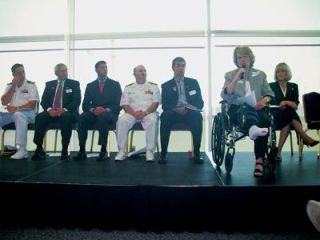EVERETT City leaders are in the forefront of efforts to fight hiring discrimination against the families of service personnel.
And since Marysville hosts a huge number of Navy personnel stationed at Naval Station Everett, its a big deal for Caldie Rogers, a Vietnam vet who is president of the Greater Marysville Tulalip Chamber of Commerce.
A new front was opened in the battle last week as military brass and community members came together to urge businesses to recognize the superior merits of military families when hiring workers. Many businesses have refused to hire spouses of service personnel, fearing they will move after a year or two when the active duty member is transferred.
Rogers led a emphatic rebuttal to those concerns last week at Naval Station Everett, and her Military Family Friendly Employment Partner Initiative is attracting attention from officials in Washington, D.C. Its illegal to discriminate against service personnel in hiring, and businesses must allow workers to return to their jobs after being called up for duty. But those laws dont apply to their families and a couple of local women spoke about their experiences when employers refused to hire them because their were married to a service person.
Melissa West is a local travel agent with a college education in marketing and psychology. During her husbands 22-year Air Force career Wests family moved nine times and only twice was she able to land a job in her field of expertise. She had to resort to construction jobs and manual labor after being turned down for jobs she was trained and educated for. West said she dug ditches, installed sprinkler systems, pools and spas, but only after she dared a contractor to hire her. Many employers were not interested in investing time to train an employee who would be hitting the road in a year or two, West told the Sept. 12 gathering. She said the same discrimination is happening today to spouses, including a Navy wife with advanced degrees who had to wait a year to get hired.
They wanted someone who would stay longer than three years, West said.
Most military families need the second income a spouse can earn; its not a choice, West said. But the silent bias keeps many military spouses from the jobs they can do.
Thats not only wrong, but its bad business, according to Rear Adm. Robert Passmore, Vice Commander of the Naval Reserve Forces Command. Many military families are ingrained in the same things that make the services a success; getting to work on time, in uniform, with a good attitude, for starters. And with changes in military deployment strategies it is common for many families to be stationed in one place for six to nine years.
Also the public workforce moves frequently these days, more than service personnel, according to Passmore.
If anything, were more stable, he said after the conference. Military families are a tremendous resource. They deserve the same opportunities the general population does.
Officials from Snohomish County, Marysville and the Tulalip Tribes vowed to help turn the tide. Tulalip Tribal Chairman Mel Sheldon Jr. is a Vietnam vet who said his people know too much about discrimination and have a rich legacy of military service. The Tribes know how valuable people are, and the task is to get other private employers on board, Sheldon said.
We are myth busting in a sense, Sheldon said. We are going to destroy the myth.
Pamela Smith is the manager of the spouse education and careers program at the Department of Defense. She said the Pentagon wants to know more about issues that effects military spouses everywhere.
This has become such an important issue, Smith said.
Military spouses need careers, not just jobs, she added.
Three other Washington state installations are part of a pilot program to offer $6,000 stipends to spouses for education.
About 120 people attended the conference, where businesses were urged to sign a pledge saying they wouldnt discriminate against military spouses.
Spokesmen from Costco, Best Buy and others told how they have had no problems with having active duty, reserves or military spouses on their staffs. John Dominguez of the Lakewood Costco said his company had 253 employees on military leave. His store manager is a retired Navy captain and Dominguez is in the Army Reserves, and hes been called up twice in the past decade hes worked for the warehouse giant. Costco paid for his health benefits during his service and reservists returning to employment with the firm are guaranteed to keep their seniority and eligibility for promotions and advancement, he said.
Rogers said the hiring bias has expanded since the Sept. 11, 2001 attacks on the United States and the increase military operations since then. She wants to see all of Snohomish Countys 32,000 businesses pledge to be a military family friendly employer, and the chamber has window stickers printed up for businesses to display. Rogers said she was already getting calls from the nations capitol about the intititive.
Locals lead effort to end hiring discrimination against military spouses
EVERETT City leaders are in the forefront of efforts to fight hiring discrimination against the families of service personnel.



